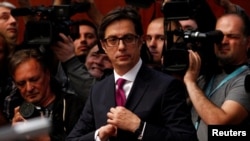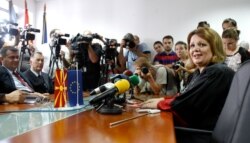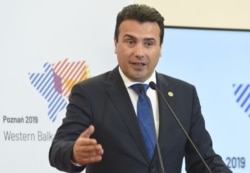This story originated in VOA's Macedonian service. Some information is from AFP.
SKOPJE, NORTH MACEDONIA — North Macedonian President Stevo Pendarovski says government institutions are failing the small Balkan nation so drastically that it could undermine prospects for long-awaited European Union accession talks.
"We have decades — not years — but decades of institutions malfunctioning, including the political institutions," Pendarovski told VOA's Macedonian service in an exclusive interview Thursday in Skopje.
"I am not talking here only about the judicial system," he said, referring to an ongoing extortion scandal that has rocked the national government, as well as the Special Prosecution Office, established in 2015 to probe high-level crime in the country.
"These vital institutions in the country are not serving the people as they should," Pendarovski said. "They do not fight crime and corruption on the level a mature democracy should."
Unfolding scandal
Last month, the country's outgoing chief special prosecutor, Katica Janeva, unexpectedly tendered her resignation amid allegations that she had been implicated in a scheme to extort millions from an indicted businessman in exchange for a reduced sentence in an unrelated case. She has since denied involvement "in any shape or form."
EU and U.S. officials have implored Skopje to complete a thorough and transparent investigation of the allegations and, if warranted, proceed with prosecutions.
Over the past several days, however, developments in the alleged bribery scheme went from bad to worse, when Italy's La Verita newspaper published new footage of what appeared to be money changing hands between the suspects — both of whom claimed to have access to Janeva — and the indicted businessman that her office was about to prosecute.
The suspects, who are now in detention, told the businessman he would receive leniency from the prosecutor in charge of his case if he paid them. It is not yet known if Janeva had any knowledge of the extortion scheme, but she confirmed that the voice heard on the recording was hers.
A unique opportunity
Pendarovski described the scandal as an international embarrassment, but also a unique opportunity for Skopje's government officials and legislators to move beyond political bickering and abide by the rule of law.
"We cannot afford to leave space for speculation," he said about whether the country could swiftly resolve the issue. "How we react on the scandal — not how individuals will react, but we as a country — will merit the EU members' determination this fall on the eligibility of North Macedonia to join the bloc."
He also said he was appalled that some of "the main actors in this drama," such as the investigators, were on vacation.
"It is not business as usual," he said. "The essence of the rule of law in the country has been challenged."
On Tuesday, North Macedonia's Prime Minister Zoran Zaev drew international condemnation for using a gay slur while trying to defend his government against the corruption scandal, which has ensnared numerous justice officials.
Zaev said Tuesday that he would "not allow a few criminals, a vain journalist and — I ask the LGBT community to forgive me — one [expletive] to overthrow the government."
He was referring to a gay TV channel owner, Bojan Jovanovski, at the heart of the extortion case.
Zaev, who had just returned from vacation, immediately posted an apology on Twitter that some found equally offensive.
"I apologize. I used the word as a character trait, not as a sexual affiliation," he wrote, adding that he was "fighting for the rights of the LGBT community as much as possible."
Both of North Macedonia's major political parties, opposition VMRO-DPMNE and the ruling Social Democratic Union, have been squabbling over the drafting of a law to regulate the prosecution, which will determine the fate of the special prosecutor's office that Janeva used to run.
Whether new legislation can be ratified — a precondition for EU accession talks — will determine the pace of North Macedonia's European accession process.






